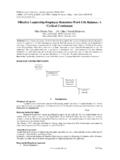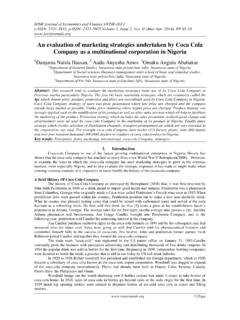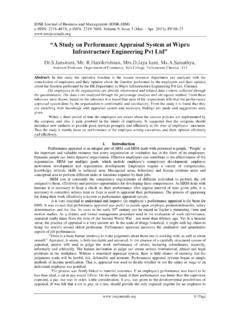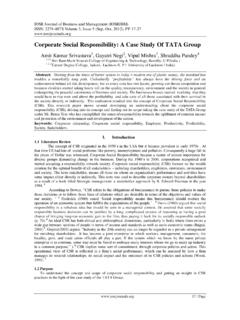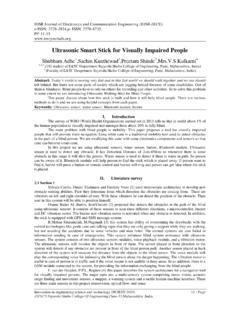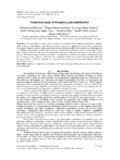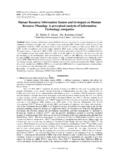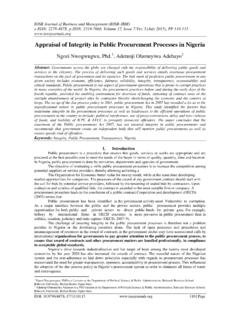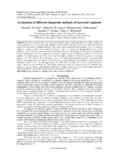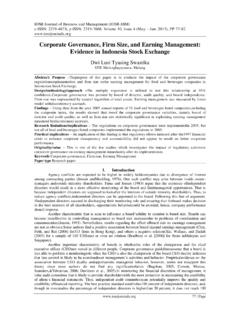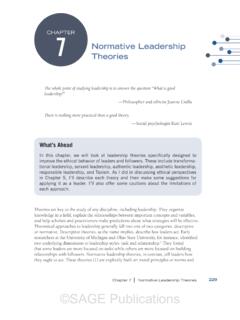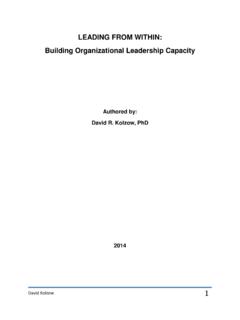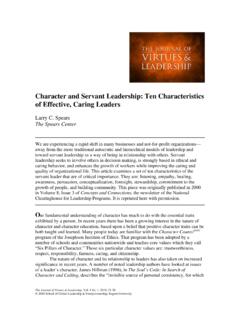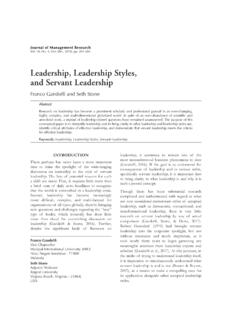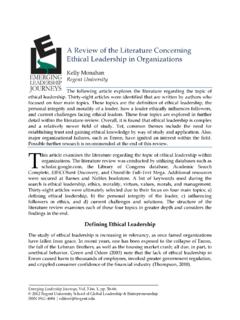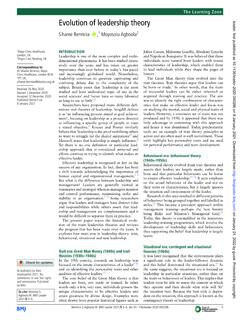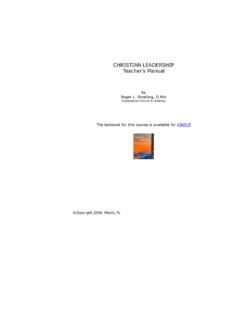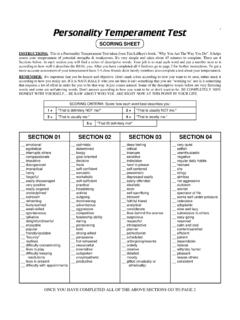Transcription of Ethical Leadership: Best Practice for Success
1 IOSR Journal of Business and Management (IOSR-JBM) e-ISSN: 2278-487X, p-ISSN: 2319-7668 PP 112-116 International Conference On Innovative Management Strategies 112 | Page Madanapalle Institute Of Technology & Science, Bangalore, INDIA Ethical leadership : Best Practice for Success Dr Subhasree Kar Associate Professor Sambhram Academy of Management Studies Bangalore ABSTRACT:- In the contemporary value based society ethics plays an important role in all spheres of life. Corporate houses are no exceptions to it. The Ethical scandals in business raised questions about the role of leadership and Ethical conducts and shaken the public confidence on business organizations. At this juncture, the concept of Ethical leadership is getting popularity and prominence. Leaders, if Ethical brings tremendous business impacts.
2 In contrast, if the Ethical ways of leading is not practiced it spoils the whole image of the business. That s why Ethical leadership should be a concern for today s organizations not only for better organizational performance but also to sustain competitive advantage. The concept of Ethical leadership is not confined only to philosophical literature rather in today s business environment it is imperative and a weapon to reach the pinnacle of Success . This paper is an attempt to give a comprehensive review of the concept of Ethical leadership , the issues, challenges and concerns in Ethical leadership along with a model of successful Ethical leadership and business performance. The review of literature indicates that Ethical leadership remains largely unexplored, offering researchers opportunities for new discoveries and leaders opportunities to improve their effectiveness.
3 Keywords:- Ethical leadership , Value based leadership , leadership effectiveness I. INTRODUCTION The stories about corporate greed and responsibilities are the main headlines in the today s news. Ethical scandals in business have raised important questions about the role of leadership in Ethical conduct. The cut throat competitive business environment many a times compels the top authorities of the corporate houses to be insensitive towards people and planet and get only profit and Success by any means. For the sake of getting profit at any cost they even don t hesitate to break the laws, violate the rules, regulations, damage the environment, harm the stakeholders disfiguring their own image of responsible corporate citizen. At this stormy business weather the answer to all these issues in bringing tranquility, equilibrium is a tilt towards Ethical leadership .
4 The leader should be a key source of Ethical guidance for employees. The time is right to make Ethical leadership a central theme during leadership conversations and leadership development programs. It is leadership that differentiates the good companies from the great companies, and a critical component of effective leadership . II. Ethical leadership Though the study of Ethical leadership is increasing in relevancy but still scientific research in this area was limited. Much has been written about ethics and leadership from a normative or philosophical perspective, suggesting what leaders should do. A more descriptive and predictive social scientific approach to ethics and leadership is required to explore the fundamental concept of Ethical leadership . Various authors attempt to correctly identify Ethical leadership .
5 Greenleaf (1977), who theorized servant leadership , states, Service to followers is the primary responsibility of leaders and the essence of Ethical leadership . Frank (2002) states that transformational leadership is the outward display of Ethical leadership . Studies of an Ethical dimension of leadership has been embedded primarily within the transformational and charismatic leadership domains (Bass & Avolio, 2000), The Ethical dimension of leadership represents a small component that falls within the nexus of inspiring, stimulating and visionary leader behaviors that make up transformational and charismatic leadership . Ethical leadership is defined as the demonstration of normatively appropriate conduct through personal actions and interpersonal relationships, and the promotion of such conduct to followers through two-way communication, reinforcement, and decision-making (Brown, Trevino, & Harrison, 2005).
6 IOSR Journal of Business and Management (IOSR-JBM) e-ISSN: 2278-487X, p-ISSN: 2319-7668 PP 112- International Conference On Innovative Management Strategies 113 | Page Madanapalle Institute Of Technology & Science, Bangalore, INDIA In contrast, Cumbo (2009) focuses on the leader when defining Ethical leadership . A leader is considered Ethical when inward virtues direct the leader s decision-making process. Followers simply are beneficiaries of a leader living a virtuous life. A leader is motivated not by influencing others but rather living by one s own virtues. The author states that virtues are amplified when the leader exhibits imagination, compassion, empathy, and discernment . Ethical leadership is not about a process but rather a way of being and making the right choice (Darcy, 2010).
7 As a result, the inner morality of a leader will be examined. Though slightly different definitions have been constructed, all of these authors agree that Ethical leadership is focused on influencing followers to do the right thing. Ethical leadership is knowing your core values and having the courage to live them in all parts of your life in service of the common good. III. INDIVIDUAL CHARACTERISTICS AND Ethical leadership Individual characteristics of leaders are also likely to be associated with Ethical leadership . Ethical leaders are characterized as honest, caring, and principled individuals who make fair and balanced decisions. Ethical leaders also frequently communicate with their followers about ethics, set clear Ethical standards and use rewards and punishments to see that those standards are followed.
8 Finally, Ethical leaders do not just talk a good game they Practice what they preach and are proactive role models for Ethical conduct. King (2008) observed numerous managers across industries and noted eight common Ethical values shared by all. The author found that Ethical leadership is commonly exhibited by honesty, loyalty, dedication to purpose, benevolence, social justice, strength of character , humility, and patience . These principles may be learned but ultimately originate from a religious faith or spiritual foundation. The author found that those who integrate faith into their workplace were more often considered Ethical leaders. Therefore, the author argues that ethics derive from a place of faith. Observers have long believed that personal traits such as integrity would be important to perceptions of leadership effectiveness and research has borne that out.
9 For example, survey research has linked perceived leader effectiveness with perceptions of the leader's honesty, integrity, and trustworthiness (Den Hartog et al., 1999; Kirkpatrick & Locke, 1991; Kouzes & Posner, 1993; Posner & Schmidt, 1992). And, cognitive trust (the exercise of care in work, being professional, dependable; McAllister, 1995) has been associated with effective styles of leadership as well (Dirks & Ferrin, 2002). Building on this work, Trevino et al. (2000, 2003) conducted exploratory research and found that a number of personal characteristics were related to Ethical leadership . Ethical leaders were thought to be honest and trustworthy. Beyond that, Ethical leaders were seen as fair and principled decision-makers who care about people and the broader society, and who behave ethically in their personal and professional lives.
10 The researchers characterized this as the moral person aspect of Ethical leadership , representing observers' perceptions of the leader's personal traits, character , and altruistic motivation. But, the study also revealed another important aspect of Ethical leadership that Trevino and colleagues' labeled the moral manager dimension. This aspect of Ethical leadership represents the leader's proactive efforts to influence followers' Ethical and unethical behavior. Moral managers make ethics an explicit part of their leadership agenda by communicating an ethics and values message, by visibly and intentionally role modeling Ethical behavior, and by using the reward system (rewards and discipline) to hold followers accountable for Ethical conduct. Such explicit behavior helps the Ethical leader to make ethics a leadership message that gets followers' attention by standing out as socially salient against an organizational backdrop that is often ethically neutral at best (Trevino et al.)
